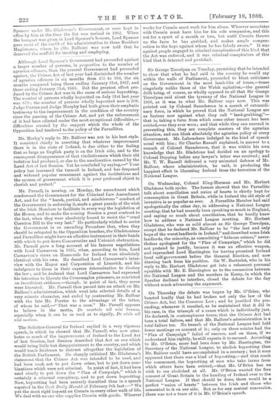On Thursday the debate was begun by Mr. O'Brien, who
boasted loudly that he had broken not only the law of the Crimes Act, but the Common Law ; and he justified the pro- ceeding, whenever it resulted, as he maintained that it did in his case, in the triumph of a cause which is individually just. He declared, in contemptuous tones, that the Crimes Act had been a total failure, and that Mr. Balfour's administration is a total failure too. No branch of the National League had held fewer meetings on account of it ; only on three estates had the "Plan of Campaign" failed of success, and on these, if we understand him rightly, he still expects it to succeed. According to Mr. O'Brien, more had been done by Mr. Harrington, the Secretary of the National League, to abolish boycotting than Mr. Balfour could have accomplished in a century; but it soon appeared that there was a kind of boycotting,—and that much the commonest, the boycotting of men who take farms from which others have been evicted,—that Mr. O'Brien has ne wish to see abolished at all. Mr. O'Brien wanted the free consent of Great Britain to the handing of Ireland over to the National League. If that should be done, there would be a perfect " union of hearts " between the Irish and those who consented to it on our side. But as for any mutual concession, there was not a trace of it in Mr. O'Brien's speech.


































 Previous page
Previous page